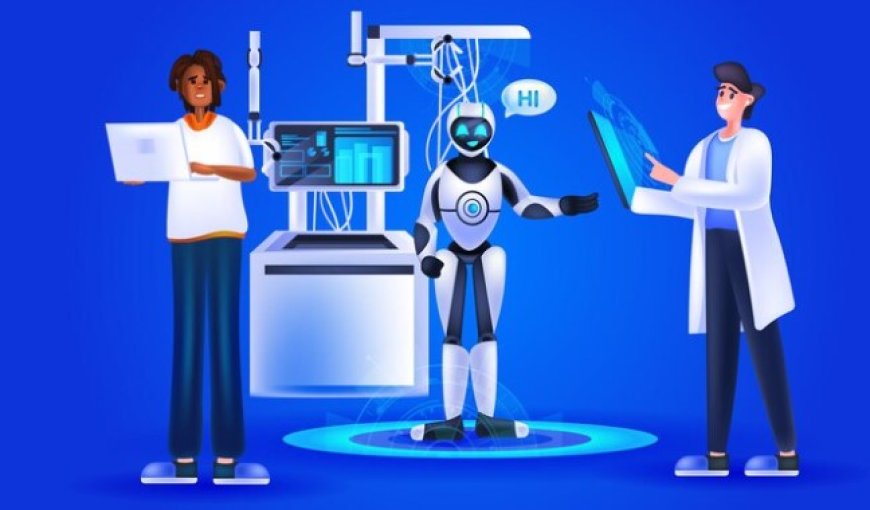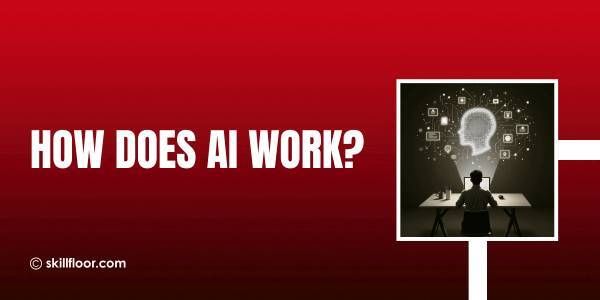AI and Healthcare: Revolutionizing Medical Diagnoses and Treatment
Explore the groundbreaking synergy of AI and healthcare, revolutionizing medical diagnoses and treatment. Discover how artificial intelligence is transforming the future of medicine.

In the realm of healthcare, Artificial Intelligence (AI) has emerged as a revolutionary force. It involves the application of advanced algorithms and computational power to analyze vast amounts of medical data, transforming the way healthcare is delivered. AI in healthcare signifies a promising journey towards more accurate diagnoses, personalized treatment plans, and efficient medical research and development. Its significance lies in enhancing patient outcomes, reducing costs, and ultimately reshaping the entire healthcare landscape to provide better care and support for individuals around the world.
AI in healthcare
AI in healthcare refers to the application of artificial intelligence technologies to enhance the diagnosis, treatment, and management of patients' health. It involves the utilization of advanced algorithms and machine learning techniques to analyze vast amounts of medical data, from patient records to diagnostic images. By mimicking human cognitive functions, AI aids healthcare professionals in making more accurate and timely decisions, ultimately leading to improved patient outcomes. This technology holds immense potential to revolutionize the healthcare industry by augmenting the capabilities of healthcare providers and optimizing the delivery of medical services.
AI-Powered Medical Diagnoses
Machine Learning Algorithms for Medical Imaging
In the realm of medical diagnoses, AI has made remarkable strides through the application of machine learning algorithms to medical imaging. These algorithms can analyze a wide array of medical images, including X-rays, MRIs, and CT scans, with astonishing accuracy and speed. By swiftly detecting anomalies and patterns that might elude the human eye, AI enhances diagnostic precision, enabling early detection and timely intervention in various medical conditions. This revolutionizes the way medical professionals approach the interpretation of visual medical data.
Natural Language Processing (NLP) for Medical Records Analysis
Another pivotal application of AI in healthcare involves Natural Language Processing (NLP), which focuses on the analysis of unstructured medical data found in electronic health records (EHRs) and clinical notes. NLP algorithms are adept at sifting through vast amounts of textual patient information to extract valuable insights. By discerning patterns, trends, and critical data points, AI-driven NLP systems empower healthcare providers to make more informed diagnoses and devise tailored treatment plans, ultimately improving the quality of care and patient outcomes.
Personalized Treatment Plans
Predictive Analytics for Patient-Specific Care:
In the realm of healthcare, one size does not fit all. Predictive analytics powered by AI has ushered in a new era of patient-specific care. By analyzing vast datasets of patient information, including medical history, genetics, lifestyle, and environmental factors, AI algorithms can predict the likelihood of specific health events. This enables healthcare providers to tailor treatment plans to individual patients, optimizing interventions, medications, and preventive measures. By harnessing the power of data, AI helps healthcare professionals make more informed decisions, improving patient outcomes and overall healthcare efficiency.
Virtual Health Assistants for Patient Education and Support:
Digital health assistants driven by AI are becoming invaluable companions for patients on their healthcare journey. These virtual assistants offer a wealth of information and support, providing patients with immediate access to medical advice, treatment guidelines, and lifestyle recommendations. They can answer queries, offer medication reminders, and even monitor vital signs through connected devices, enhancing patient engagement and adherence to treatment plans. Virtual health assistants empower patients to take an active role in managing their health, fostering a sense of control and well-being in the process.
Drug Discovery and Development:
In the realm of drug discovery and development, AI plays a pivotal role in revolutionizing the traditional pharmaceutical industry. AI-driven algorithms and computational models are transforming the entire drug development lifecycle, from initial research to clinical trials.
AI assists researchers in identifying potential drug candidates with a level of efficiency that was previously unimaginable. Machine learning models can analyze vast datasets of molecular information, predicting which compounds are most likely to exhibit the desired therapeutic properties. This not only speeds up the early stages of drug discovery but also reduces the costs associated with experimental testing.
Clinical trials are a critical phase in drug development, but they are often time-consuming and expensive. AI technologies, such as predictive modeling and patient data analysis, help streamline this process. By identifying suitable patient cohorts, predicting patient responses, and optimizing trial protocols, AI improves the chances of success while reducing the overall timeline and costs involved in bringing a drug to market.
AI-driven drug discovery and development are not only changing the way new drugs are found but also offering the potential for more targeted and effective treatments, ultimately benefitting patients and the healthcare industry as a whole.
Enhancing Remote Monitoring and Telemedicine
Wearable Devices and IoT in Healthcare
The integration of wearable devices and the Internet of Things (IoT) in healthcare has revolutionized remote monitoring. Patients can now wear devices such as smartwatches or fitness trackers that continuously collect vital data like heart rate, blood pressure, and oxygen levels. These devices transmit real-time information to healthcare providers, enabling early detection of anomalies and timely interventions. This approach enhances patient engagement and provides healthcare professionals with valuable insights into a patient's health trends.
Telehealth Platforms with AI-Driven Diagnostics
Telemedicine platforms have become indispensable in providing remote healthcare services. AI plays a crucial role in these platforms by powering diagnostics and treatment recommendations. Through video consultations and AI algorithms, physicians can remotely assess patients' symptoms and medical history. AI-driven systems can aid in diagnosing conditions, suggesting appropriate treatments, and even flagging potential emergencies. This blend of telehealth and AI ensures accessible, efficient, and effective healthcare delivery, particularly in situations where in-person visits may not be feasible or safe.
Ethical Considerations and Regulatory Framework
-
Ensuring privacy and security of patient data
-
Adhering to medical ethics and guidelines in AI applications
-
Establishing transparent and responsible AI development practices
-
Addressing bias and fairness concerns in AI algorithms
-
Complying with healthcare data protection regulations (e.g., HIPAA in the U.S.)
-
Monitoring and regulating AI healthcare applications to safeguard patient rights and well-being
-
Encouraging collaboration between AI developers, healthcare professionals, and policymakers to establish ethical AI standards and guidelines.
Overcoming Challenges and Adoption Hurdles
-
Addressing concerns regarding AI's impact on healthcare decision-making
-
Ensuring transparency and explainability of AI algorithms
-
Establishing robust data governance and privacy measures
-
Navigating complex regulatory and compliance requirements
-
Bridging the gap in AI literacy among healthcare professionals
-
Securing adequate funding and resources for AI integration
-
Mitigating resistance to change within healthcare organizations
-
Encouraging collaboration and knowledge-sharing across the healthcare industry
-
Monitoring and addressing biases in AI models to ensure fairness and equity in healthcare delivery.
Future Trends and Innovations
The field of AI in healthcare is continuously evolving, and the future promises exciting trends and innovations that will further revolutionize medical diagnoses and treatment. Here's a glimpse of what to expect:
As AI algorithms become more sophisticated, we can anticipate even higher accuracy in medical diagnoses, with the potential for early detection of diseases that were previously challenging to identify at an early stage. Machine learning models will continue to learn from vast datasets, improving their predictive capabilities.
Personalized medicine will see significant advancements, with AI-driven treatment plans tailored to an individual's genetic makeup, lifestyle, and medical history. This precision medicine approach will lead to more effective treatments and fewer adverse effects.
Drug discovery and development will become more efficient and cost-effective, thanks to AI-powered simulations and virtual testing. This will accelerate the introduction of new medications and therapies, addressing previously unmet medical needs.
The integration of AI with wearable devices and the Internet of Things (IoT) will usher in a new era of remote patient monitoring. Continuous real-time data collection and analysis will enable healthcare providers to intervene proactively, reducing hospital readmissions and improving overall patient outcomes.
Ethical considerations and regulatory frameworks will evolve to address the unique challenges posed by AI in healthcare. Stricter data privacy regulations and ethical guidelines will ensure the responsible and secure use of patient data.
AI's role in healthcare education and training will expand, with healthcare professionals receiving specialized training to harness the full potential of AI tools and technologies in clinical practice.
AI is revolutionizing healthcare by enhancing medical diagnoses, enabling personalized treatment plans, expediting drug discovery, and improving remote monitoring through telemedicine and wearable devices. While ethical considerations and regulatory frameworks are essential, the potential for AI to positively impact patient outcomes is undeniable. Encouraging ongoing research and innovation is key to harnessing AI's full potential for a healthier future in healthcare.






























































